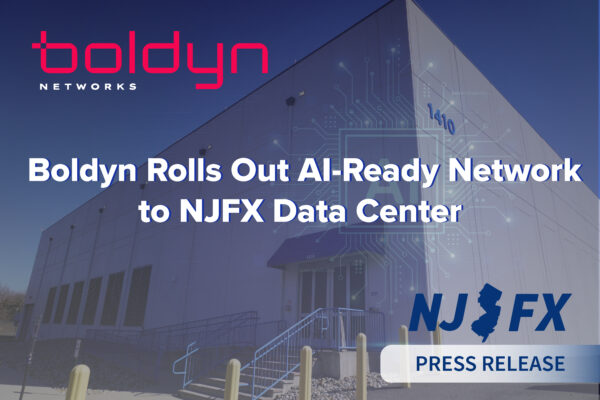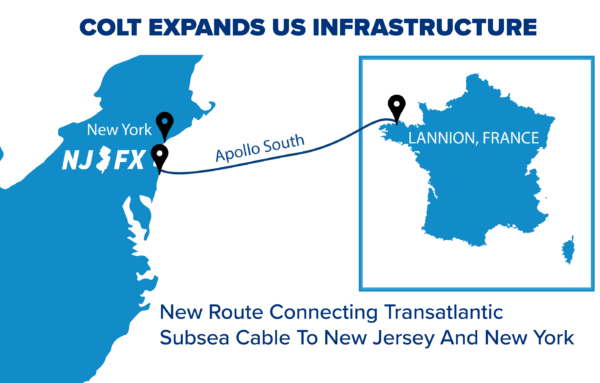
The AI-Ready Cable Landing Station is Coming
NJFX today announced the completion of a comprehensive Basis of Design for a new 10MW high-density AI data hall, delivering an expected 1.25 PUE and 8MW of usable IT load.
Kevin Ayerdis + Emily Newman
March 30, 2023

Hello all and welcome back to Luminaries in Telecom!
We reached out to see what insights our education system is discovering about meta topics that are affecting not just our industry, but society entirely. Current trends including infinitely complex open A.I space, ChatGPT, Cyber Warfare/Security, and the Internet of Things (IoT). This month we got that opportunity to illuminate a scholar in the industry, Dr. Jenifer Sunrise Winter, a professor at the University of Hawaii at Manoa School of Communication and Information. She is also the Editor-in-Chief of the Journal of Information, Communication, and Ethics in Society and the Co-Chair of the Research Committee at Pacific Telecommunication Council (PTC).
Dr. Winter has immersed herself in studying and researching multiple facets of the industry. She has made her mark on the world, showcasing years of dedication to teaching and understanding the field of telecommunications through various publications. We are eager to share all that we have learned from Dr. Winter, in this enlightening Q&A edition of NJFX’s Luminaries in Telecom!
—
Q: Events such as ever increasing public/private sector A.I and the rise of cyber/domestic attacks of major institutions such as Uber, GitHub etc. As well as attacks on multiple substations nationwide the recent attack in D.C. comes to mind. How do we further prevent and safeguard ourselves as a member of the telecoms community and as a further message to our colleagues and partners?
A: We have seen increasingly sophisticated attacks on critical cyber and physical infrastructure for some time, and this will likely continue to accelerate. Today, every sector – the economy, agriculture, natural resources, health, energy, education, defense – is increasingly reliant on telecom networks, and homes, cars, and even our bodies are also connected to myriad networked devices. This is a constantly changing landscape with more and more sophisticated attacks and more vectors for attack. This includes ever-sophisticated AI as both a threat and possible defense. We can even look ahead to concerns such as the possible development of quantum encryption/decryption. There is no easy answer, of course, but telecoms companies should continue to work closely with federal agencies on securing critical infrastructure, and we need to create an even better pipeline of trained cybersecurity experts.
Q: It seems as though the Gen pop is OK with quickly clicking “Yes” on the terms of service (T.o.S) giving carte blanche to companies to buy/sell/trade user data. This in turn further increasing malware/spam/phishing attempts by bad actors to gain further data on those uninitiated such as the youth/elderly. What can we do as a collective to crackdown on such a widespread issue further preventing these bad actors from spreading?
A: The EU, under GDPR, has taken action to restrict the collection and use of personal data, and we see individual U.S. states adopting similar policies. We also see signs that the U.S. government is looking towards stronger data protection laws and enforcements. I think this is a first step towards a solution. For example, I note with interest recent discussions about the FTC requiring “algorithmic disgorgement” (i.e., destruction of AI algorithms derived from unlawful data collection).
Q: What are some communications related issues Hawai‘i residents face vs. mainlanders may not be aware of?
A: Hawaiʻi is the most geographically isolated population center in the world (1.44 million residents and a few hundred thousand visitors on an average day). It is a volcanic island chain with seven populated islands located in the central Pacific Ocean. As such, we are highly reliant on submarine fiber and some more limited satellite coverage. Decades ago, people thought that we would always be the meeting place between East and West, and that new submarine fiber drops were assured. Over time, as the technology progressed, more and more new fiber routes bypassed us. We are fortunate to have some amazing telecom leaders here who have been working to ensure we are not left behind (for example, the Broadband Hui, a collection of more than 200 telecoms folks, local government leaders, non-profits, and educators who want to improve broadband infrastructure and advance digital equity). Many people in the U.S. will be surprised to learn that our urban areas have historically been a bit ahead of the U.S. mainland as far as telecom services (early mobile adoption, WWW, broadband, etc.) We have been innovators and early adopters. We had early giants like Norm Abramson (AlohaNet) and Wes Peterson here on the UH faculty, and have always had passionate leaders who worked for the benefit of Hawai‘i and the Pacific. We do have a notable rural-urban divide as with many parts of the U.S., so there is still much work to do!
Q: What are the biggest trends/concerns/predictions to watch for?
A: I think it is clear that we have entered a completely new telecoms policy space, largely brought about by the challenges of multiple technologies characterizing the modern Internet—and data is central to it. Many of us are very interested in artificial intelligence or the Internet of Things or Big Data – I myself have published in all of these areas. What I’ve come to realize is that we really need to think of these as a collection of interrelated technologies that together are driving the so-called “data revolution”. This revolution is not just about more data-–there are many novel data types-–the Fitbit or Apple Watch you may be wearing, sensors in the natural environment—there’s a huge amount of data being shared and, importantly, new analytic tools to make sense of it. In many cases, these data are aggregated, shared or resold–moving data beyond its original context. Predictive analytics also creates new data that move beyond their original context. Data linkages are increasingly common –and some argue necessary for innovation in AI and machine learning. There are many seeking to exploit the value of these data resources. My forecast for this year is that we are going to see more tensions between Big Tech and government, with heightened concern about individual privacy and security, and social equity. I think we will see stronger attempts in the U.S. to create and enforce related regulations and policies.
For the record, I am not really sold on ChatGPT or the Metaverse being transformative in any fundamental way this year. I am, however, watching with interest.
Q: Out of your many publications which one would you like highlighted. Any favorites that have direct correlation to some current geopolitical events?
A: I recently published an article in Telecommunications Policy with my colleague Elizabeth Davidson on the subject of personally generated health data (PGHD) governance. PGHD are data collected by patients themselves using apps provided by health technology firms. These data often fall outside of conventional health data regulation in the U.S. (such as HIPAA) and some other countries. We are seeing friction between federal- or state-regulated health data and what is essentially self-regulated PGHD collected by Big Tech, and our work offers insights to resolve this. Given that data is so fundamental to the function of many aspects of our lives, questions about how we can better manage it has led me to work for several years in this area. The pandemic of the last three years has highlighted in a way that we could not have imagined the importance the governance of health data has to policy at all levels.
Q: Millennials, Gen-Z, and Gen Alpha are quickly approaching an age of responsibility. We are trying to find solutions to the worlds many complex issues all the while trying to find the specialization that suits us best. Do you have any words of encouragement to the young leaders entering the industry?
A: I think everyone benefits from a diverse skill set. It fosters problem-solving and interdisciplinary insights. Don’t feel you have to narrow in on an exact career path right away. Take a variety of subjects that interest you, go to events, and try an internship or two. If you are in the workforce, see what various teams are doing within the organization. There is definitely a place for you, so find others that are doing what you think looks interesting and learn about their own pathways and the competencies they think were most essential to develop.
Q: Any closing remarks/asides to close with?
A: Mahalo! I hope that we will see you in Hawai‘i –perhaps at PTC ’24!
—–
Thank you again Dr. Winter for taking the time out of your schedule to enlighten us! This concludes this month’s feature of Luminaries in Telecom. Please feel free to add to the conversation and tell is what you learned from this interview. Sound off in the comments below with any fun facts/specifics, or any suggestions about any movers and shakers in telecom history you think deserve a feature send a message to [email protected]. We at NJFX hope you’ve gleaned a bit of inspiration to take with you through the rest of your week!

NJFX today announced the completion of a comprehensive Basis of Design for a new 10MW high-density AI data hall, delivering an expected 1.25 PUE and 8MW of usable IT load.

NJFX today announced the completion of a comprehensive Basis of Design for a new 10MW high-density AI data hall, delivering an expected 1.25 PUE and 8MW of usable IT load.

Red Sea conflict threatens Key Internet Cables. Maritime attacks complicate repairs on underwater cables that carry the world’s web traffic.

Red Sea conflict threatens Key Internet Cables. Maritime attacks complicate repairs on underwater cables that carry the world’s web traffic.

Red Sea conflict threatens Key Internet Cables. Maritime attacks complicate repairs on underwater cables that carry the world’s web traffic.

Red Sea conflict threatens Key Internet Cables. Maritime attacks complicate repairs on underwater cables that carry the world’s web traffic.
